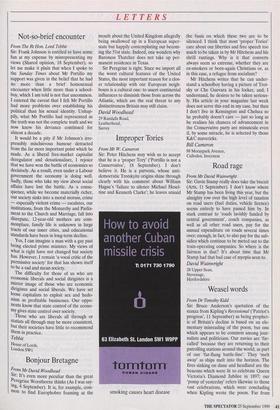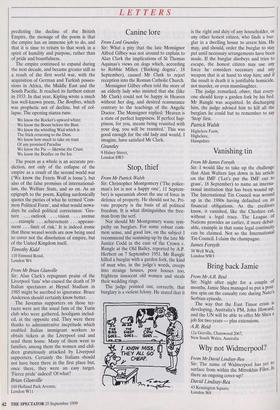Weasel words
From Dr Timothy Kidd Sir: Bruce Anderson's quotation of the stanza from Kipling's Recessional (Tatriot's progress', 11 September) as being prophet- ic of Britain's decline is based on an ele- mentary misreading of the poem, but one which appears to be common among jour- nalists and politicians. Our navies are 'far- called' because they are returning to their patrolling stations around the world, as part of our 'far-flung battle-line'. They 'melt away' as ships melt into the horizon. The fires sinking on dune and headland are the beacons which were lit to celebrate Queen Victoria's Diamond Jubilee in 1897; our `pomp of yesterday' refers likewise to those vast celebrations, which were concluding when Kipling wrote the poem. Far from
LETTERS
predicting the decline of the British Empire, the message of the poem is that the empire has an immense job to do, and that it is time to return to that work in a spirit of humility and purpose, rather than of pride and boastfulness.
The empire continued to expand during the next decade, and became greater still as a result of the first world war, with the acquisition of German and Turkish posses- sions in Africa, the Middle East and the South Pacific. It reached its furthest extent in 1933. In that year, Kipling wrote a much less well-known poem, The Bonfires, which was prophetic not of decline, but of col- lapse, The opening stanza runs:
We know the Rocket's upward whizz; We know the Boom before the Bust. We know the whistling Wail which is The Stick returning to the Dust. We know how much to take on trust Of any promised Paradise We know the Pie — likewise the Crust. We know the Bonfire on the Ice.
The poem as a whole is an accurate pre- diction, not only of the collapse of the empire as a result of the second world war ('We know the Fenris Wolf is loose'), but also of the false promises of international- ism, the Welfare State, and so on. As an epigraph to the poem, Kipling sardonically quotes the pieties of what he termed 'Com- mon Political Form', and what would nowa- days be called political correctness: 'Ges- ture . . outlook . . . vision . . . avenue . . . example . . . achievement . . . appease- ment . limit of risk.' It is indeed ironic that these weasel words are now being used to cover not the dissolution of empire, but of the United Kingdom itself.
Timothy Kidd
110 Esmond Road, London W4



























































































 Previous page
Previous page